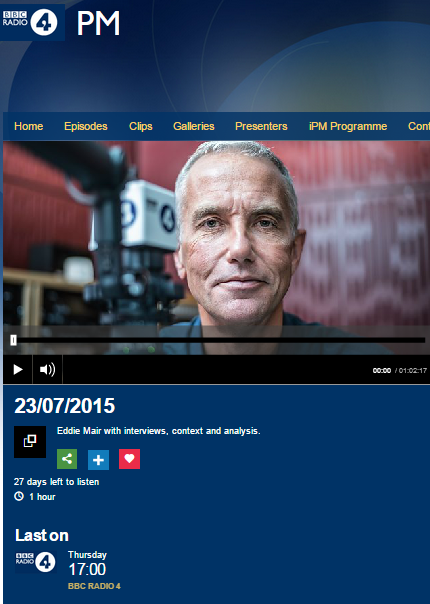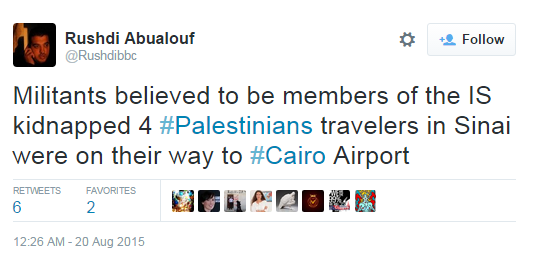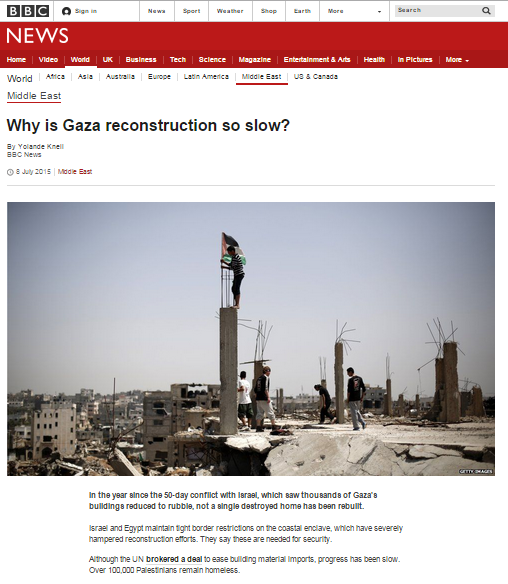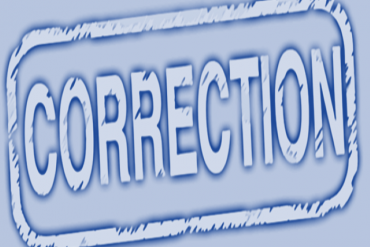In part one of this post we noted the BBC’s amplification of unchallenged, inaccurate, partial and context-free messaging from Michael Deas – the coordinator in Europe for the Palestinian BDS National Committee – on BBC television news and the BBC News website on July 21st.
Two days later, listeners to the BBC Radio 4 programme ‘PM’ also got a dose of the BDS campaign’s propaganda when Deas cropped up again in an item (from 26:10 here) by the BBC Jerusalem Bureau’s Kevin Connolly. Presenter Eddie Mair introduced the segment as follows:
“A campaign to boycott Israeli products is claiming increasing success. It says it’s defending human rights. The Israeli government accuses it of antisemitism. Reporting for PM; our Middle East correspondent Kevin Connolly.”
Connolly: “Israel is under pressure, looking for ways to push back against growing calls around the world for a boycott of goods produced in the farms and factories of the West Bank – land it captured in the Middle East war of 1967 and which the wider world regards as occupied Palestinian territory.”
Refraining from reminding listeners that the area was in fact part of the region allocated by the League of Nations for the establishment of the Jewish national home before it was occupied by Jordan for 19 years or why the Six Day War broke out, against the backdrop of a song Connolly goes on:
“Reggae is not Israel’s only weapon, of course. But this song does emphasis one of its key points. How, when human rights are trampled in the four corners of the earth, does it find itself the target of such a well-organised and single-minded boycott campaign?”
Listeners next hear an unidentified voice say:
“There’s a growing fear inside Israel that it’s facing international isolation of the kind that South Africa faced under apartheid. So we saw about six months ago a hundred Israeli business leaders in Israel issuing an appeal on the front page of one of Israel’s biggest newspapers urging the Israeli government to take action to stem the tide of boycotts.”
Connolly then introduces his contributor:
“Michael Deas – campaigning director of the Boycott, Divestment and Sanctions National Committee in London – believes the tide on this issue is starting to run their way. The holy grail for the BDS movement is to impose on Israel the kind of damage once inflicted on white South Africa by anti-apartheid campaigners. And Michael Deas says it’s not enough to boycott goods that come from Israeli settlements on the West Bank; something more comprehensive is called for.”
Listeners hear Deas deliver the same messaging previously promoted on BBC television news and on the website.
“The Palestinian call for a boycott of Israel is for a boycott of all Israeli products. Now we know that some people and some organisations are really at the moment only comfortable boycotting products that come from settlements and that’s a position that we understand and can sympathise with. The problem is is [sic] the Israeli export companies that are exporting oranges and avocados, they routinely lie about where their products are coming from so the only safe way for people to avoid buying products from the settlements is not to buy Israeli products altogether.”
What listeners do not hear, however, is any accurate and impartial information concerning the BDS campaign’s real aims or its origins which would enable them to put Deas’ claims and messaging into their correct context.
Connolly moves on to ticking his impartiality box by bringing two Israelis into his item, beginning with an Israeli winemaker.
“The world looks very different to Ya’akov Berg – an Israeli winemaker whose family home sits in rolling vineyards on the West Bank – or Judea and Samaria as he prefers to call it. The Psagot winery’s corporate video, with Old Testament figures swirling across the landscape, makes a familiar Israeli point: that the land is theirs by biblical right and is not negotiable.”
Whilst some Israelis may indeed express such views, that of course is not the legal basis for Israeli claims to Judea and Samaria. But Connolly has already passed up on the opportunity to inform audiences of the fact that those regions were included in the Mandate for Palestine in 1922, preferring to blinker listeners with the notion of “Palestinian territory”.
After a few words from Mr Berg, listeners hear unidentified shouting and chanting: “One, two, three, four, occupation no more. Five, six, seven, eight….”. Connolly refrains from providing any information about that insert but it bears remarkable resemblance to an audio track he used in a January 2014 report which covertly promoted the Palestine Solidarity Campaign’s agenda regarding the Israeli company SodaStream and his ensuing words further suggest that the audio track was recycled from that report.
“The boycott movement is clearly starting to feel it’s working with the grain of history, pointing to companies moving out of the West Bank, apparently in response to political pressure overseas – although Israel can equally argue that major international companies like Microsoft and Apple are still investing.”
Connolly’s enthusiastic amplification of redundant BDS messaging of course leaves no room for listeners to be informed that the move of the SodaStream factory from Mishor Adumim to the Negev was prompted by financial agreements which pre-dated the BDS campaign’s targeting of the company.
“There’s another reason for the move to the Negev – a multi-million dollar subsidy the company is eligible for as a result of the move to Lehavim. In a deal signed in 2012, SodaStream agreed to build a production plant in the newly established Idan Hanegev Industrial Zone, with an estimated cost of NIS 280 million ($78 million). The plant is set to employ about 1,000 people, according to Ministry of the Economy documents. In return, SodaStream is set to receive a 20% subsidy, worth as much as NIS 60 million (nearly $16 million).”
Connolly continues:
“But what about that question of whether a South Africa moment is looming? That point where ordinary consumers overseas see a ‘produce of Israel’ label on an avocado or a pomegranate and instinctively shy away. Israel’s deputy foreign minister Tsipi Hotovely says the boycott campaign’s comparison with apartheid is offensive and wrong.”
Listeners then hear seven sentences from Hotovely before Connolly sums up.
“In arguments about Israel it’s always hard to be sure if debate is changing people’s minds or just reinforcing the opinions they held anyway. Either way, you can be sure that for both sides, the boycott debate is one of the key battle grounds of the future.”
That, of course, should be all the more reason for the BBC to present the issue of the BDS campaign to its audiences accurately, impartially and comprehensively. But instead of providing them with the full range of information concerning that political campaign’s funding, origins, claims and aims, the BBC instead acts as its cheerleader by misleading audiences with presentation of the campaign as being connected to ‘human rights’ and whitewashing of its demonization and delegitimisation of Israel.
Moreover, the BBC’s unsubstantiated and unsourced inflation of the BDS campaign’s ‘success’ and its promotion of the notion that BDS is “growing” and “working with the grain of history” clearly has the effect of mainstreaming the campaign into public consciousness and turning the BBC into a self-conscripted activist in this political crusade to bring about the demise of Jewish self-determination.
Is that really a place in which licence fee payers would like to see their national broadcaster?
Kevin Connolly’s BDS promotion and amplification did not, however, end there. More to come in part three of this post.




